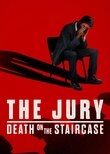The British jury system – judgement by twelve of one's peers – is shrouded in secrecy, but does that only serve to cover up flaws in the system?
Juries are a cornerstone of British justice, but studies have suggested that up to a quarter of juries' verdicts may be susceptible to inaccuracies influenced by a range of factors beyond objective evidence, and that most jurors – ordinary people who are often in court for the first time - do not understand all the points of law they are supposed to be judging upon. The secrecy that surrounds jury verdicts – in the UK, they are forbidden from sharing their reasoning – means furthermore that it is impossible to check the soundness of the decision-making.
The Jury: Murder Trial will examine the jury system for the first time on British television by recreating an entire, real murder trial from the original transcripts in front of two randomly selected juries, neither of whom are aware of the other. Filmed over ten days, in a former courthouse in Essex, the series will take a forensic look at the inner workings of justice.
The two juries will be asked to judge on the real case of a man who admits he killed his wife, but whose defence maintains that he lost control, and is therefore not guilty of murder. Actors will recreate the trial in front of the two juries, who will watch unaware of each other, from specially built separate compartments in the courtroom. What will the two juries decide, and why? Will they come to the same conclusion from the exact same evidence presented in the same way or will other factors play a part in their decision? How well will they follow the complexities of the law around loss of control? And after they have deliberated, will they even agree with each other's verdicts?








